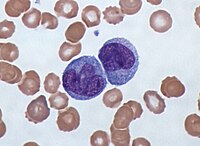
Photo from wikipedia
Macrophages are critical cells in the innate immune response to microorganisms sensed in the tissues. During infections, the interaction between pathogens and macrophages leads to a macrophage response that includes… Click to show full abstract
Macrophages are critical cells in the innate immune response to microorganisms sensed in the tissues. During infections, the interaction between pathogens and macrophages leads to a macrophage response that includes cytokine production, antigen processing and presentation in the context of MHC molecules, expression of T cell costimulatory molecules and recruitment of innate defense effectors, which results in clearance of infection. However, Neisseria gonorrhoeae can suppress the protective immune response at this level, avoiding its detection and elimination. Studies addressed to develop the interactions between macrophages and Neisseria gonorrhoeae allow us to find potential targets to be exploited with vaccines and therapeutic drugs. In this chapter, we describe protocols to generate human monocyte-derived macrophages and assess their response to infection with Neisseria gonorrhoeae.
Journal Title: Methods in molecular biology
Year Published: 2019
Link to full text (if available)
Share on Social Media: Sign Up to like & get
recommendations!